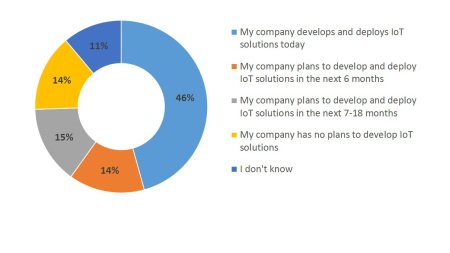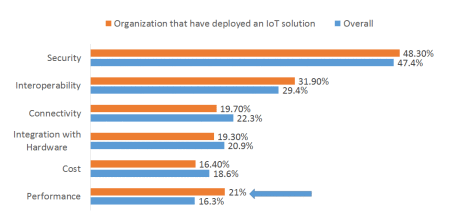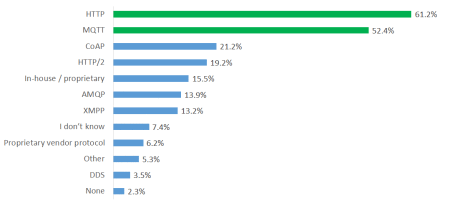Profile of an IoT Developer: Results of the IoT Developer Survey
Today we release the results of our second annual IoT Developer Survey. Like last year it provides an interesting insight into how developers are building IoT solutions.
This year the Eclipse IoT Working Group partnered with IEEE IoT and the AGILE-IoT research project to expand the scope and respondent pool for the survey. Thanks to this partnership, we had 528 participants in the survey, up from 392 last year. The partnership also allowed us to analyze the data to look for any significant difference between the different IoT communities.
As with any surveys of this nature, I encourage readers to see these results as one data point that should be compared with other data and industry trends. These results will have certain biases but I do believe these results identify some interesting trends in the IoT industry.
Key Trends for IoT developers
- Companies are shipping IoT solutions today. 46% of the respondents claim their company develops and deploys an IoT solution today. Another 29% plan to do so in the next 6 months. This is a clear indication the industry is maturing quickly.
- Security continues to be a key concern. It’s not a big surprise that security continues to be the top concern in IoT. Interoperability is the second key concern. I do believe we are on the way to solving some of the interoperability issues with projects like Eclipse Hono, Eclipse Smarthome and Eclipse Kura. I also think some of the work the AGILE-IoT project is doing will address these issues. However, it still seems the IoT industry still needs to focus on security. It is a difficult issue that needs to be solved.For companies that have deployed a solution today, performance is rising to the third key concern. It is not clear what the performance issues are, but it is something that warrants more investigation.
- Top IoT programming languages: Java, C, JavaScript, Python. Not surprising to see these languages as being the most popular for developers. I do find some people question the use of Java in IoT. The Eclipse IoT community has a number of Java projects, so there is some bias in the results toward Java. However, even when removing the respondents from the Eclipse IoT community, the top 3 languages are C, Python and Java.
- MQTT and HTTP are the dominate message protocols.Without a doubt MQTT has become a pervasive and widely used protocol for IoT. HTTP being the other protocol.
The other messaging protocol supported in the Eclipse IoT community is CoAP. It did not receive as much support, but it does appear to have support in certain industries. For instance, the use of CoAP increases if the respondent is in the IoT Platforms or Smart Cities industry. The fact IoT Platforms are supporting CoAP is expected and a good thing. It does seem Smart Cities industry is using CoAP but I am not sure where or how. If anyone has details, please leave a comment.As an aside, the success of MQTT is a testament to IBM’s strategy to standardize MQTT at OASIS and start the Eclipse Paho project. It really is a perfect case study for using open source and open standards to gain broad industry adoption. For example, 1) MQTT is now supported by IBM Bluemix, Amazon AWS IoT, MS Azure IoT, plus every other IoT middleware platform in the market, 2) the new Arduino board is also using MQTT to communicate with their cloud, and 3) Eclipse Paho and Eclipse Mosquitto are some of the most popular and active projects at Eclipse. MQTT is everywhere. Well done IBM.
- Linux is the dominant IoT operating system. Over 70% of the respondents claimed they use Linux for their IoT operating system. The next more popular section at 23% was No OS/Bare metal. In the last number of years, a number of new IoT operating systems have been introduced (ex. ARM mbed, Contiki, RIOT, Zephyr) but the adoption still hasn’t materialized. It seems many companies are using Yocto to create their own Linux distro for their IoT solution. It will be interesting to watch how these other operating systems grow in comparison to Linux.
- Amazon leads in IoT cloud services. Not terribly surprising Amazon came out on top as the top cloud service provider. However, Private/On premise was a close second so I think this is an indication that IoT cloud services is still in its infancy. What did surprise me was that Microsoft Azure was number 3 in the survey and does even better when a company has a deployed solution. This seems to reflect MS Azure’s heavy emphasis on IoT use cases.
- Open source is pervasive in IoT. I strongly believe open source is critical to the success of the IoT industry. Therefore, I was encouraged to see 58% of the respondents are actively engaged with open source. I think it is a great statement on the work we have been doing at Eclipse IoT to create an open source community for the IoT industry.
Trends between 2015 and 2016
This is the second year we have done this type of survey so I was curious what has changed between 2015 and 2016. Interestingly enough, not a lot has changed. Many of the trends and highlights mentioned above are consistent with the 2015 results. This consistency would appear to confirm that the results are a good reflection of how developers are building IoT solutions.
Thank you to everyone who participated in the survey. We definitely appreciate your input. The complete results are available on slideshare and the raw data in xls and ods format. Feel free to leave a comment or contact me if you have any questions.
| Reference: | Profile of an IoT Developer: Results of the IoT Developer Survey from our JCG partner Ian Skerrett at the Ian Skerrett’s blog blog. |










